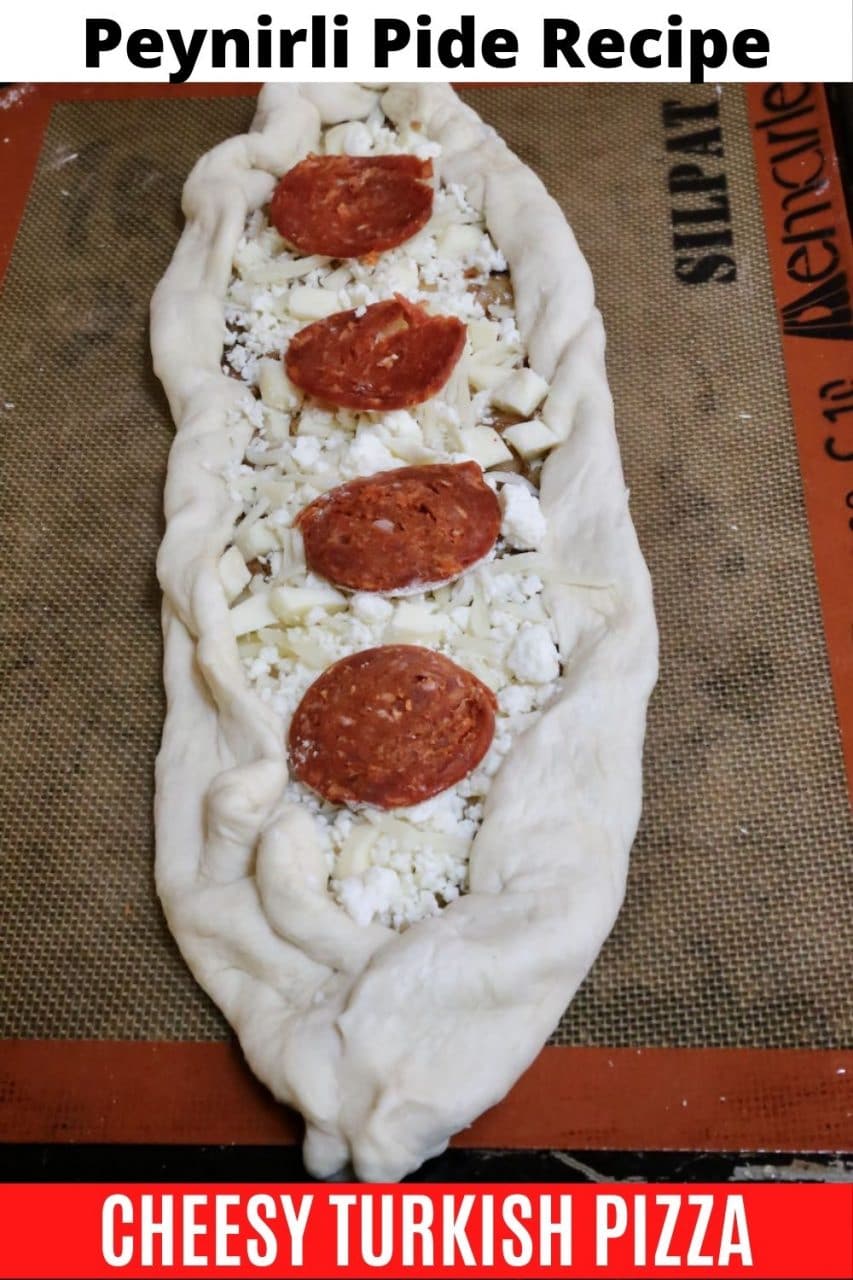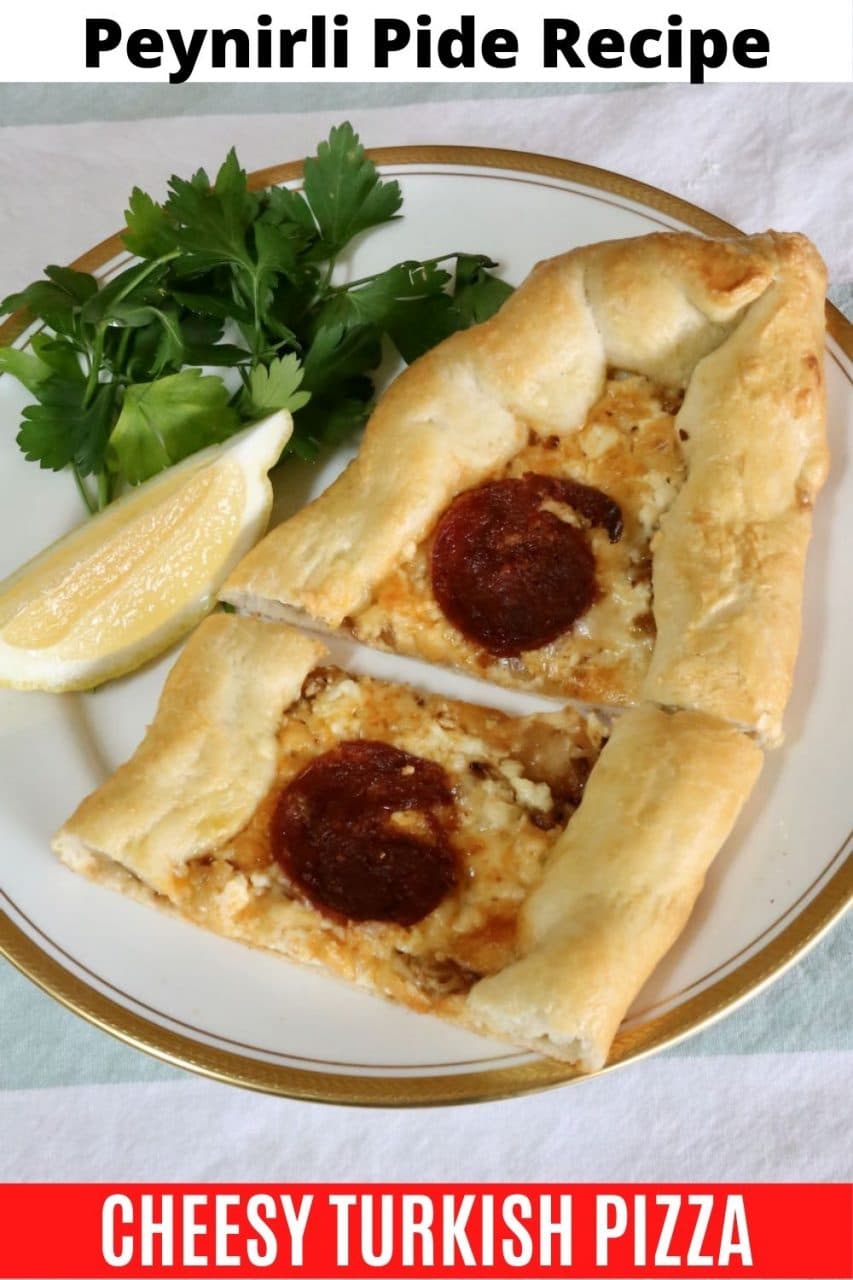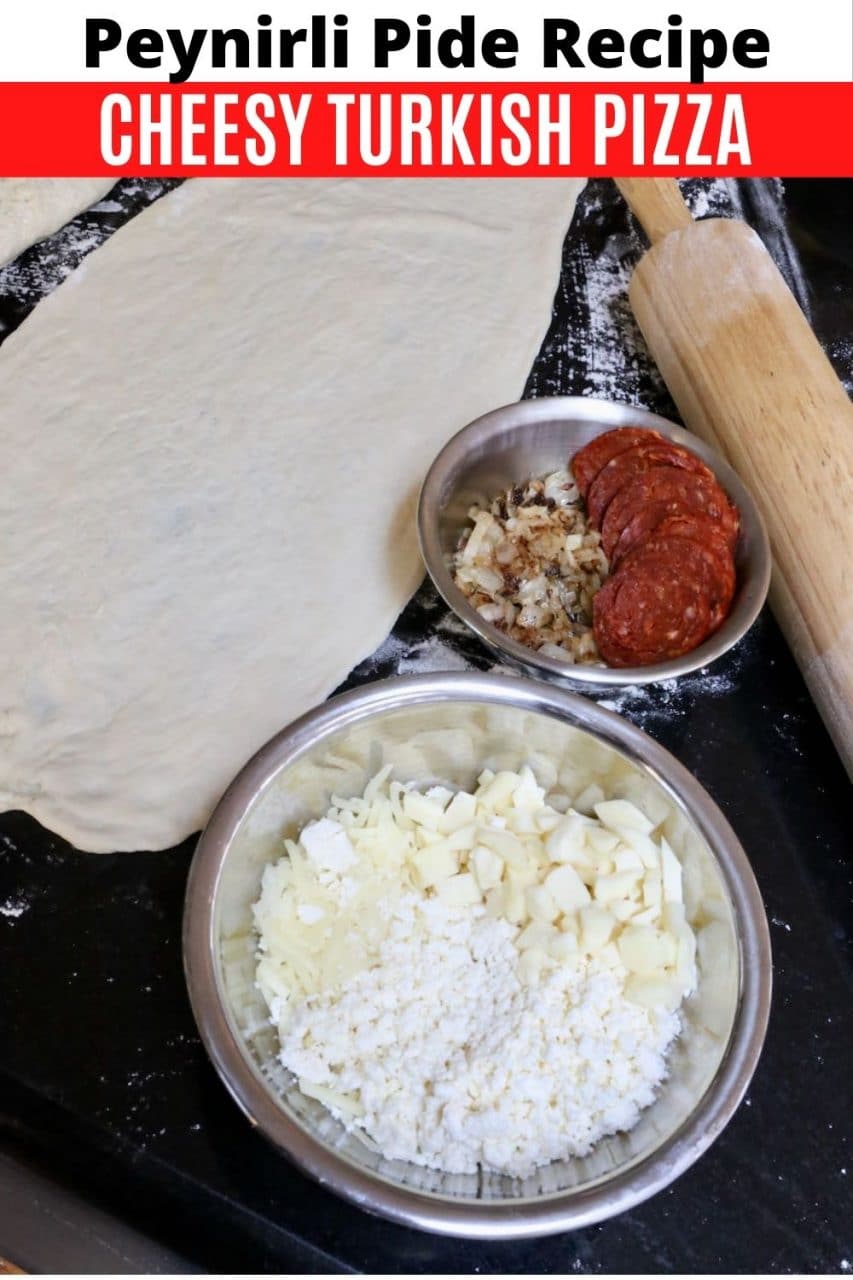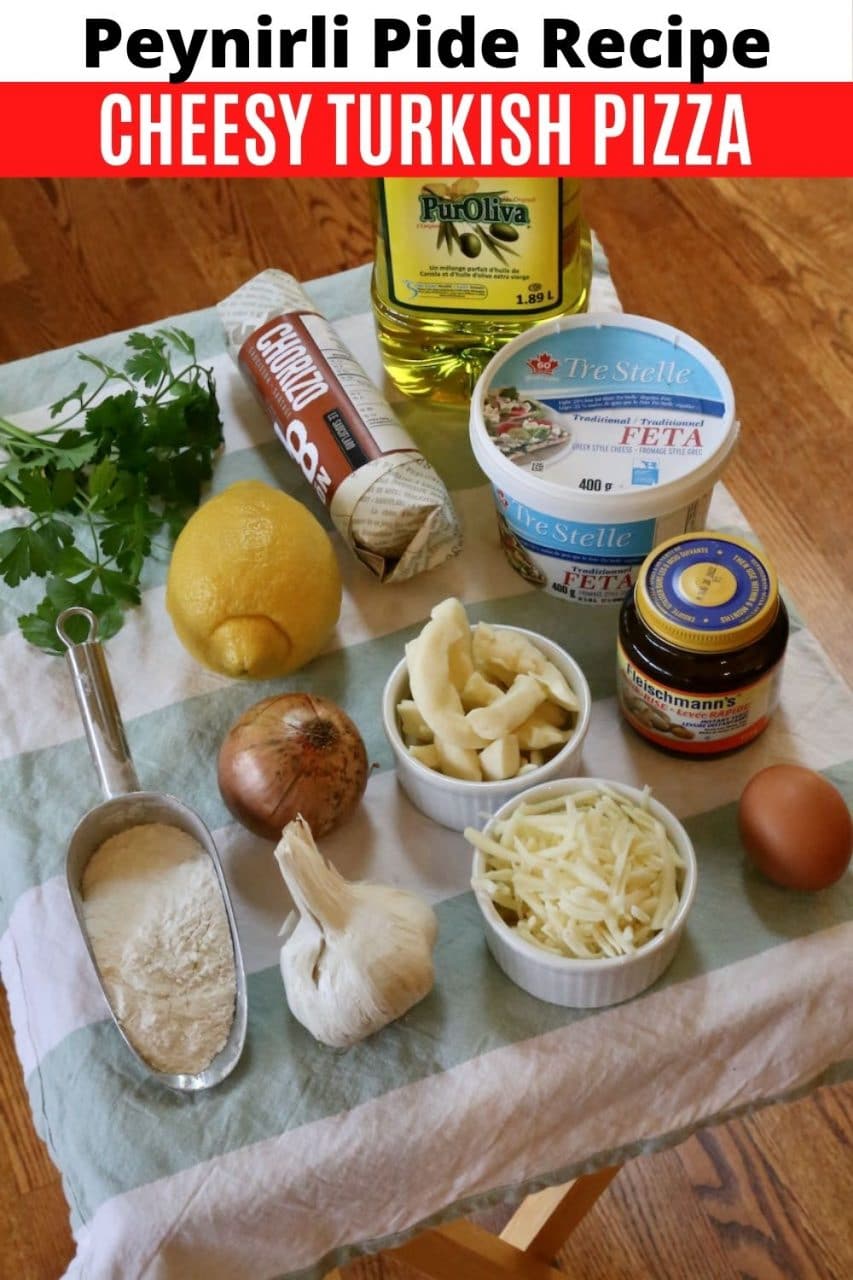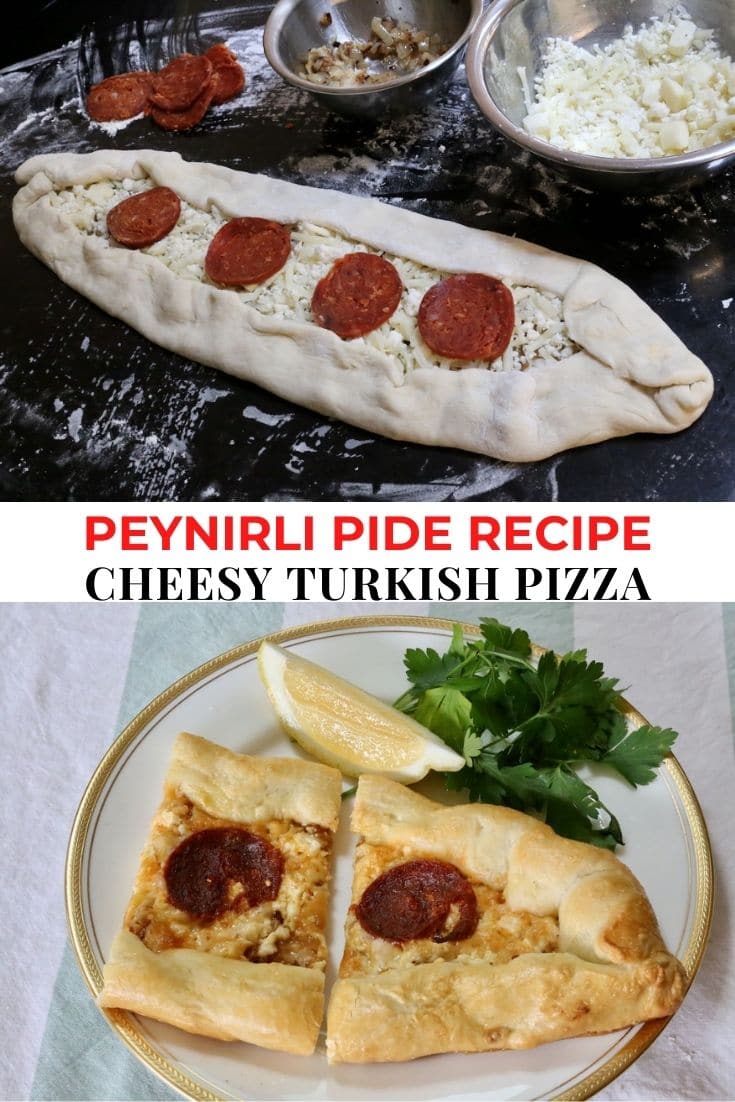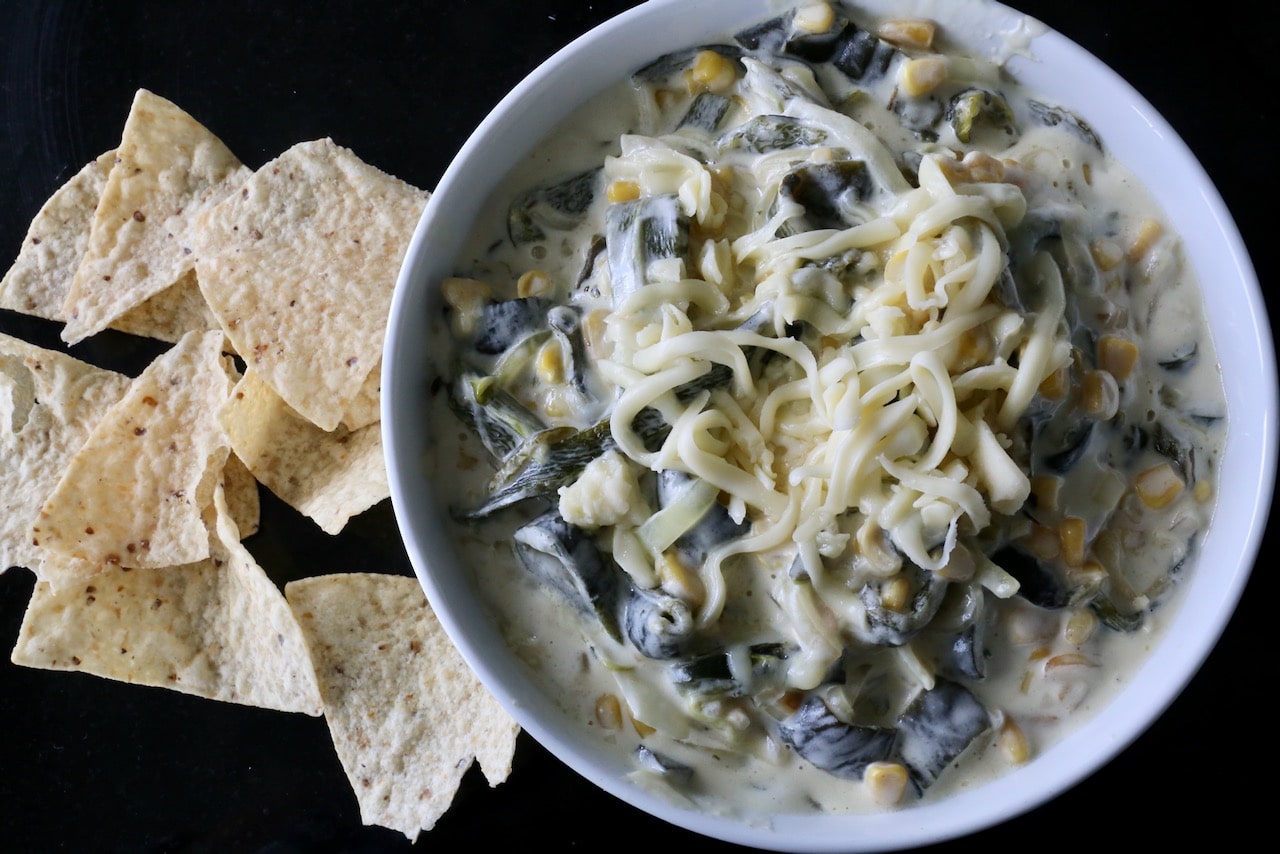Looking to learn how to bake the the best homemade Peynirli Pide?
Peynirli Pide is a traditional Turkish pastry featuring sautéed garlic, onions and cheeses. Turkey’s take on the Italian pizza features a yeasted dough moulded into an oval shape rather than circle.
Our quick & easy Turkish Pizza recipe is a perfect dinner idea to serve to cheese loving family and friends. Our authentic recipe takes under 2 hours to prepare and is best served with pickled peppers, parsley, lemon, Turkish salads, hot sauce and creamy garlic sauce.
This comforting Turkish Peynirli Pide recipe features flavourful ingredients like onions, garlic, cheddar, mozzarella, feta and sujuk, a local cured sausage.
Save This Story To Pinterest!
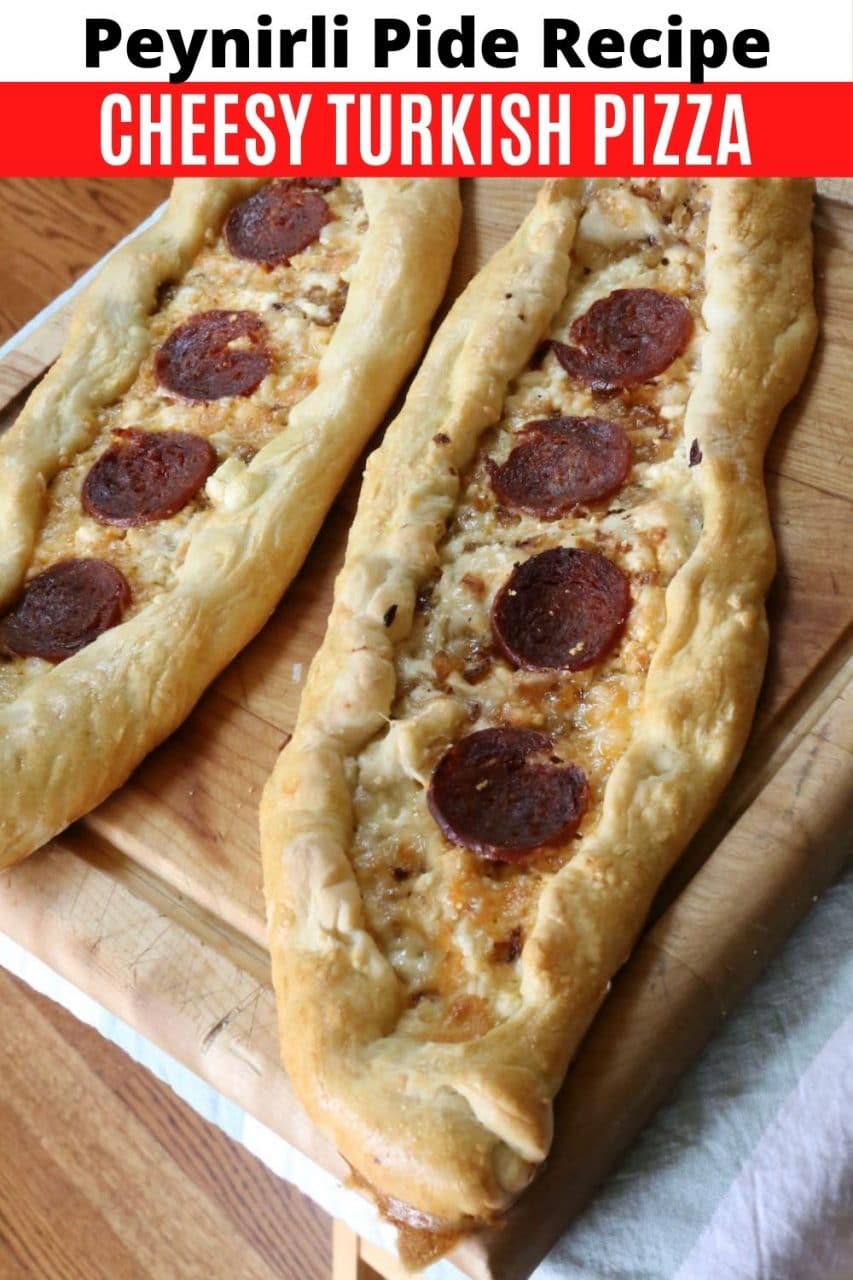
What Is Turkish Pide?
Pide, also known as Turkish flatbread and Turkish pizza, is a savoury pastry popular across Turkey.
Pide is similar to Italian pizza in that it can be prepared with many toppings. Popular traditional Turkish Pide toppings include minced meat, cheese, spinach, braised meat and cured sausage.
Turkish Pide toppings are sprinkled over a rolled-out yeast dough that is shaped like a pointy oval rather than a circle like pizza. The pointy tips of the pastry give Pide its distinguishing appearance.
Turkish Pide is often served alongside pickled vegetables, fresh parsley, lemon wedges, hot sauce and creamy garlic sauce. Without a doubt, Turkish Pide is one of the most common traditional stone-baked Turkish specialities.
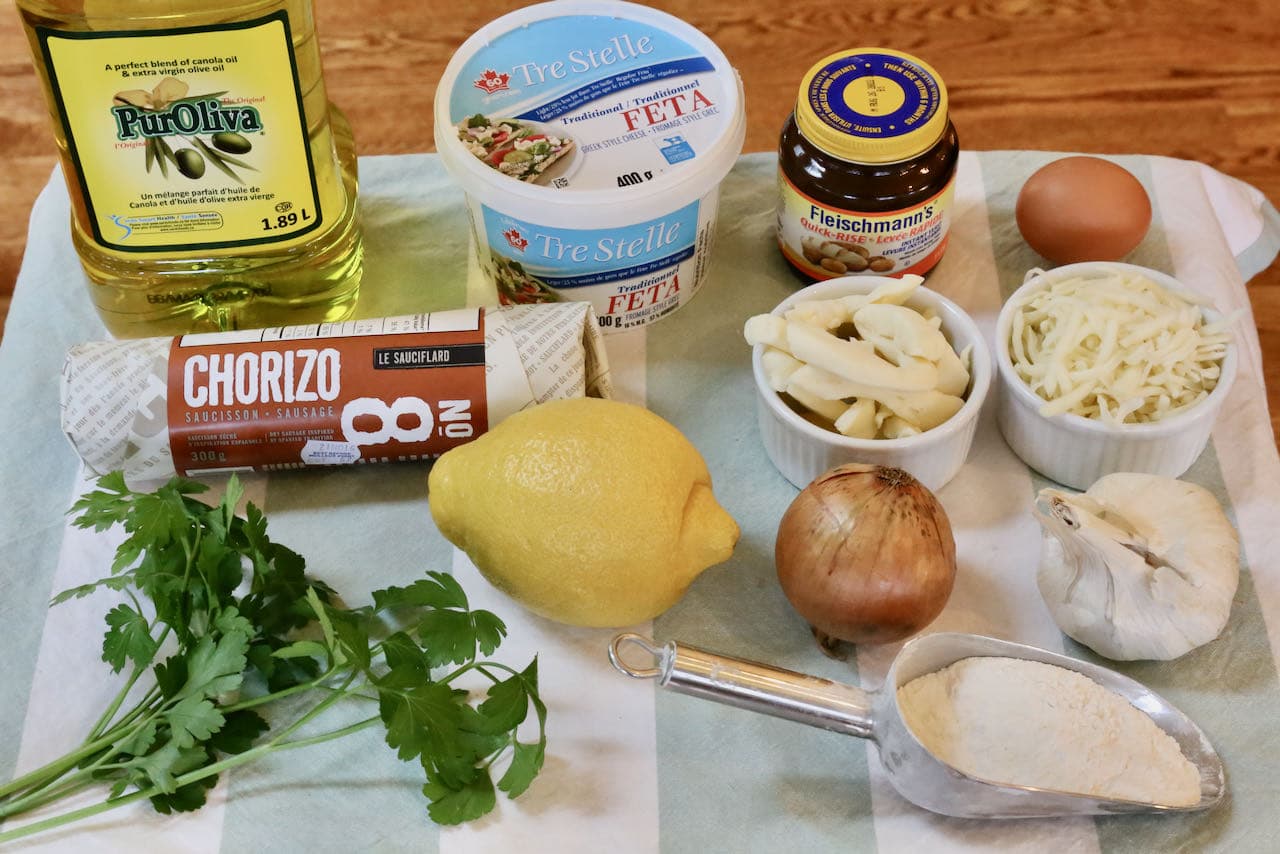
Turkish Pide Facts
Although bread making dates back to 8,000 years ago and varies from one culture to another, Turkish pide recipes started to proliferate throughout Istanbul in the 15th and 16th centuries.
The name pide was derived from “fodula”, a type of bread. When the Turks arrived in Anatolia, they started to produce different types of bread, adapting to the requirements of settled life. It is known that pide and bread were baked in a compartment called the privy bakery inside the Topkapi Palace during the Ottoman era.
During the Ottoman period, locals used to wait in long queues in front of bakeries to buy pide flatbread, at the cost of eating iftar meals late. So much so that, pide fans used to bring their own fresh eggs, black cumin and sesame seeds to the bakeries and ask the baker to add the ingredients in front of their very eyes!
Traditionally when locals talked about eating pide, they were generally referring to Kiymali Pide, the variety stuffed with a minced meat filling. Today pide is served with countless variations of toppings in different regions.
Many vegetarians enjoy the simple cheese-topped Peynirli Pide. Turkish cheese pide can also be served as a carnivores delight, topped with slices of Turkish cured sausage called sujuk. When Peynirli Pide is topped with Turkish sausage slices it looks and tastes a lot like an Italian pepperoni pizza.
The cultural tradition around pide is that it is an important food that brings people together. It is served at various social activities such as family birthdays, funerals, national holidays, weddings and religious celebrations like Ramadan.
There are popular restaurants in cities across Turkey that specialize in only baking traditional pide, much like an Italian pizzeria. Nearly all Kebab restaurants in Turkey serve pide together with different kinds of grilled meats. Pide can also be found in small pastry shops and from street food vendors.
Although it looks similar, Armenian matnakash differs from Turkish Pide due to the absence of sesame and black cumin seeds.
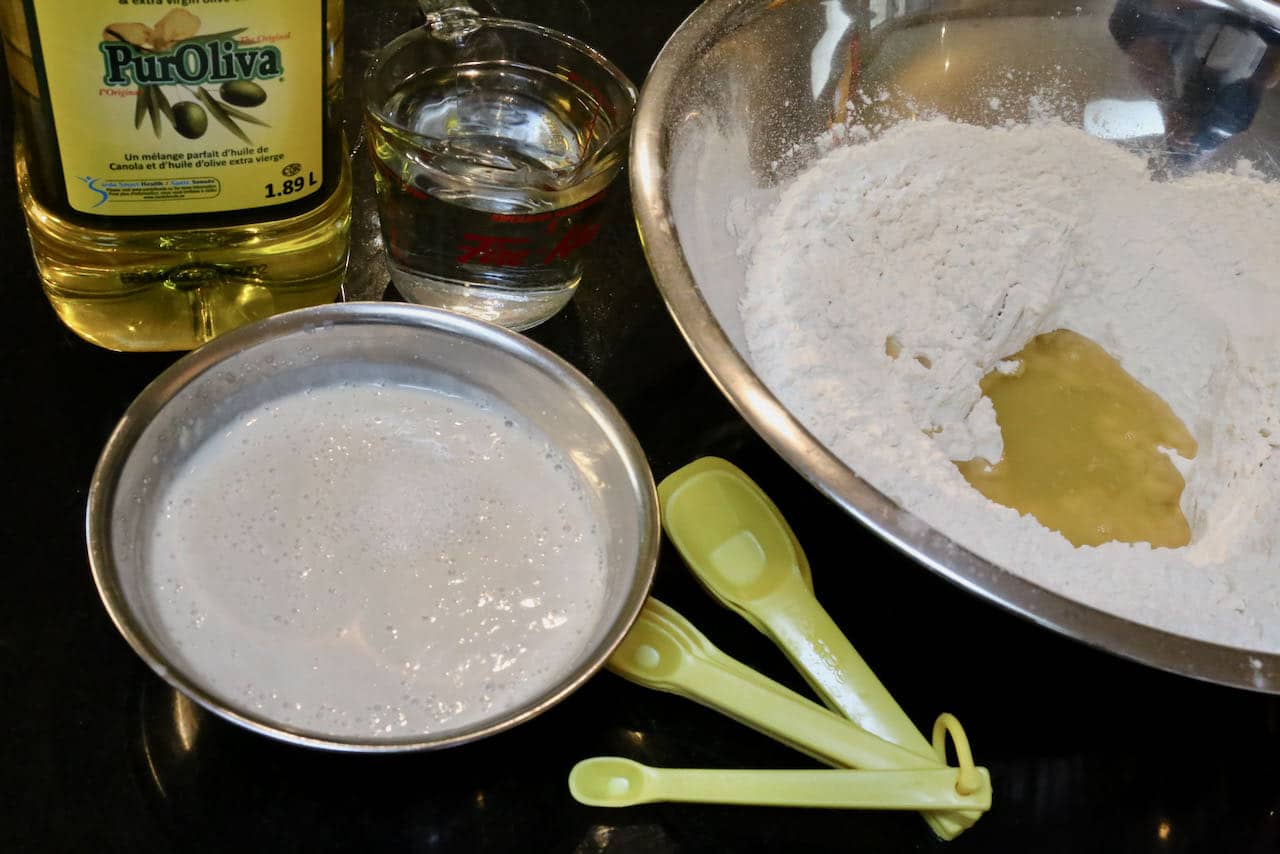
Travel to Turkey by Baking Peynirli Pide at Home
I love traveling to the Middle East and North Africa.
As a professional food and travel journalist I’ve had the opportunity to eat my way through Morocco, Egypt, Israel, Jordan, Dubai and Turkey.
During my trip to Turkey I had the opportunity to visit Goreme Cappadocia, Bodrum’s beaches, Ephesus in Selcuk and bustling Istanbul.
Shortly after arriving, I immediately fell in love with Turkish pizza. I probably ordered Peynirli Pide for lunch and dinner every other day as it satisfied my comfort food cravings.
If you’re planning a Turkish travel adventure, you’ll likely have the opportunity to sample a variety of regional Turkish Pizza recipes. Once you return from your trip, share your experience with family and friends by cooking our easy Peynirli Pide recipe at home.
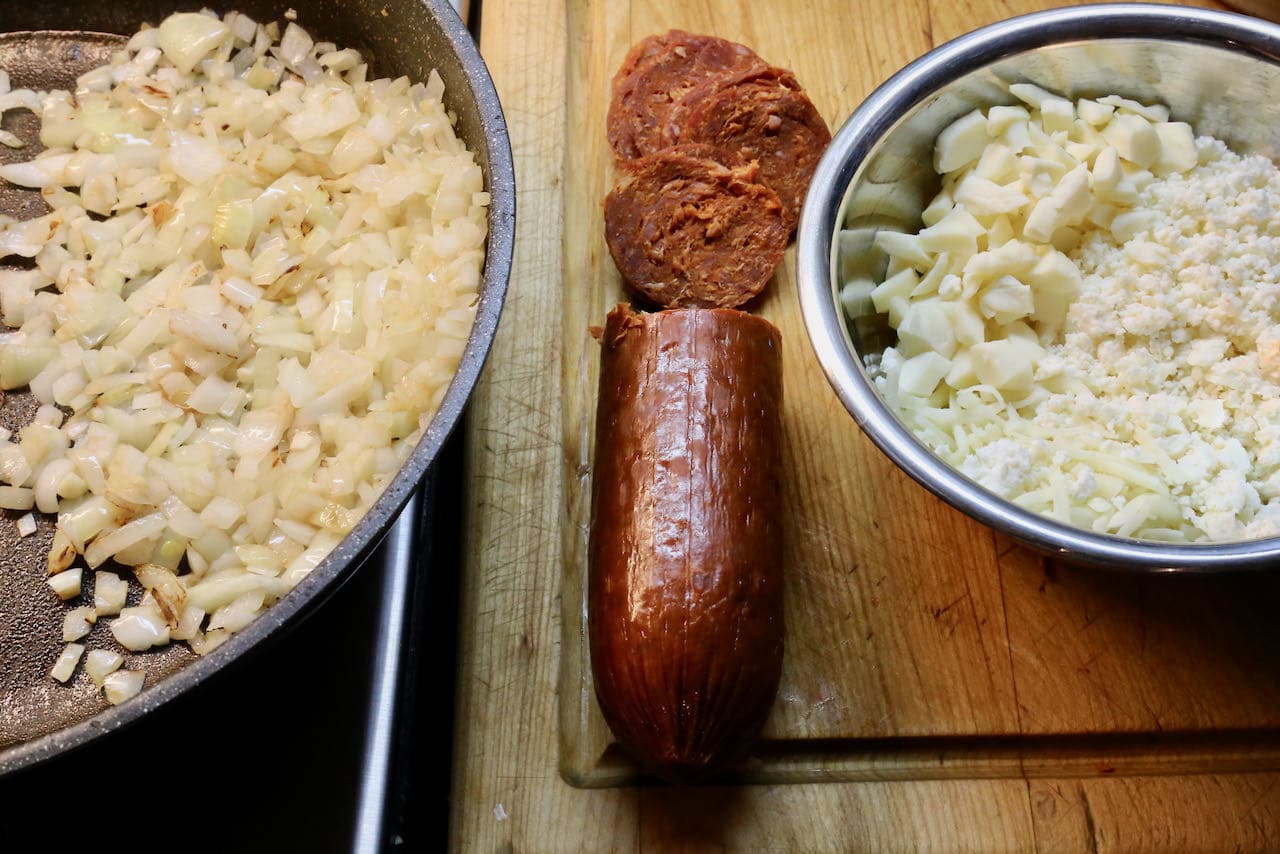
Where To Eat Authentic Peynirli Pide
If you live in a large city in Canada or America you’ll likely have access to local Turkish restaurants that serve traditional Peynirli Pide.
Haven’t traveled to Turkey before? It may be helpful to first sample Peynirli Pide at a local restaurant to better understand how the dish is served. You can assess the cheeses used in the filling and take notes on the the best garnishes and side dishes.
In Toronto, popular Turkish restaurants that may serve Peynirli Pide include Pizza Pide, Byblos, Anatolia, A La Turk, Barans, Meat Point, Sofra Istanbul, Mustafa and Galata Cafe.
You May Also Enjoy Reading…
- Travel to Goreme Cappadocia, Turkey
- Travel to Bodrum, Turkey
- Selcuk and Ephesus in Turkey
- Travel to Istanbul, Turkey
- A Culinary Walking Tour with Istanbul Eats
- Tugra Restaurant at Ciragan Palace Kempinski Istanbul
- Seasons Restaurant at Four Seasons Hotel Istanbul At Sultanahmet
- Aqua Restaurant at Four Seasons Hotel Istanbul At The Bosphorus
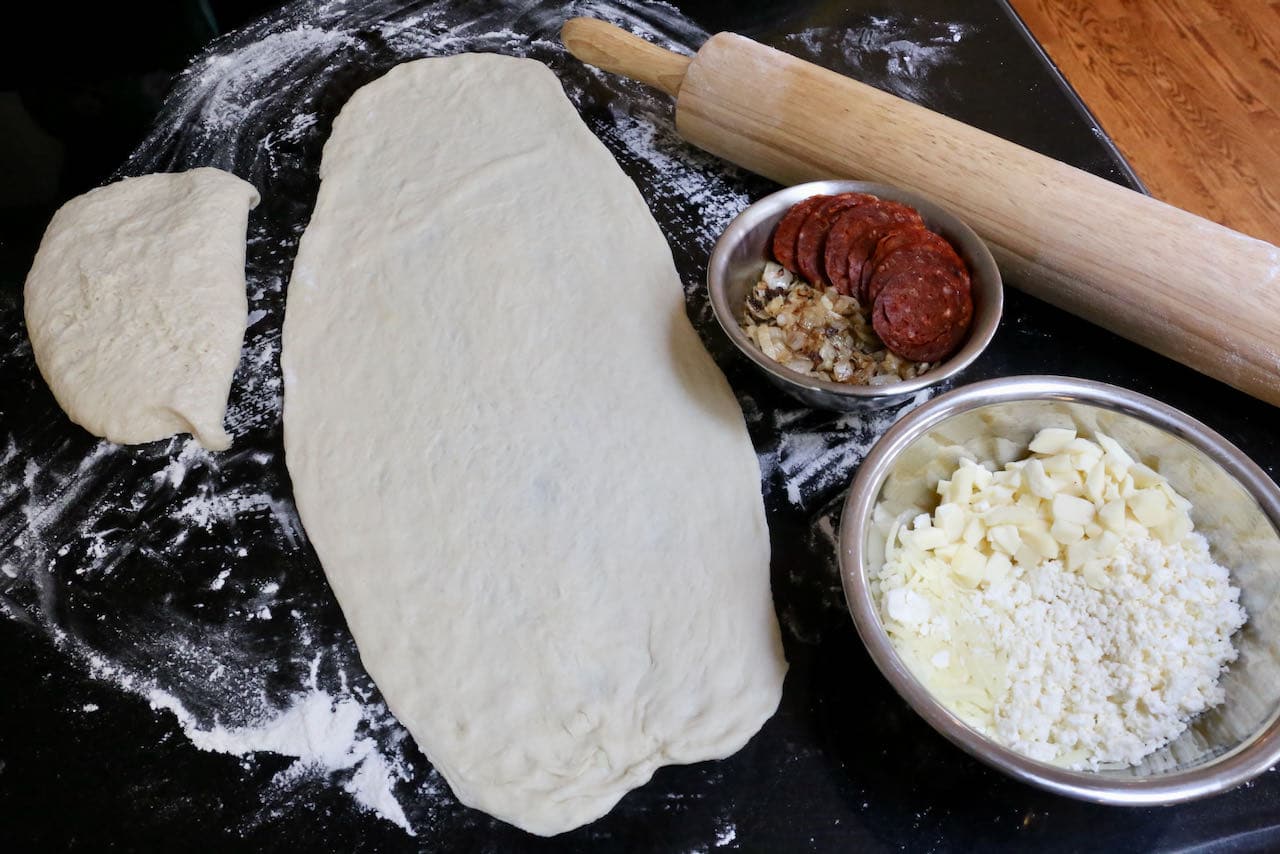
My Family Loves Homemade Peynirli Pide
After I tasted Peynirli Pide for the first time I told my parents that I actually prefer Turkish Pide to Italian pizza.
I baked my recipe for Peynirli Pide for my family to share my love for the popular Turkish pastry and they both instantly fell in love!
If you love fresh and flavourful Middle Eastern meals, you’ll love biting into a steaming slice of Kiymali Pide.
Many people prefer Turkish Pide to pizza because of the way it’s served. If you’re eating at a Pide shop in Turkey you’ll typically receive condiments at the table including pickled vegetables, lemon wedges for spritzing, fresh parsley, creamy garlic kebab sauce and hot sauce.
In our house, authentic Turkish Pide trumps pizza any day!
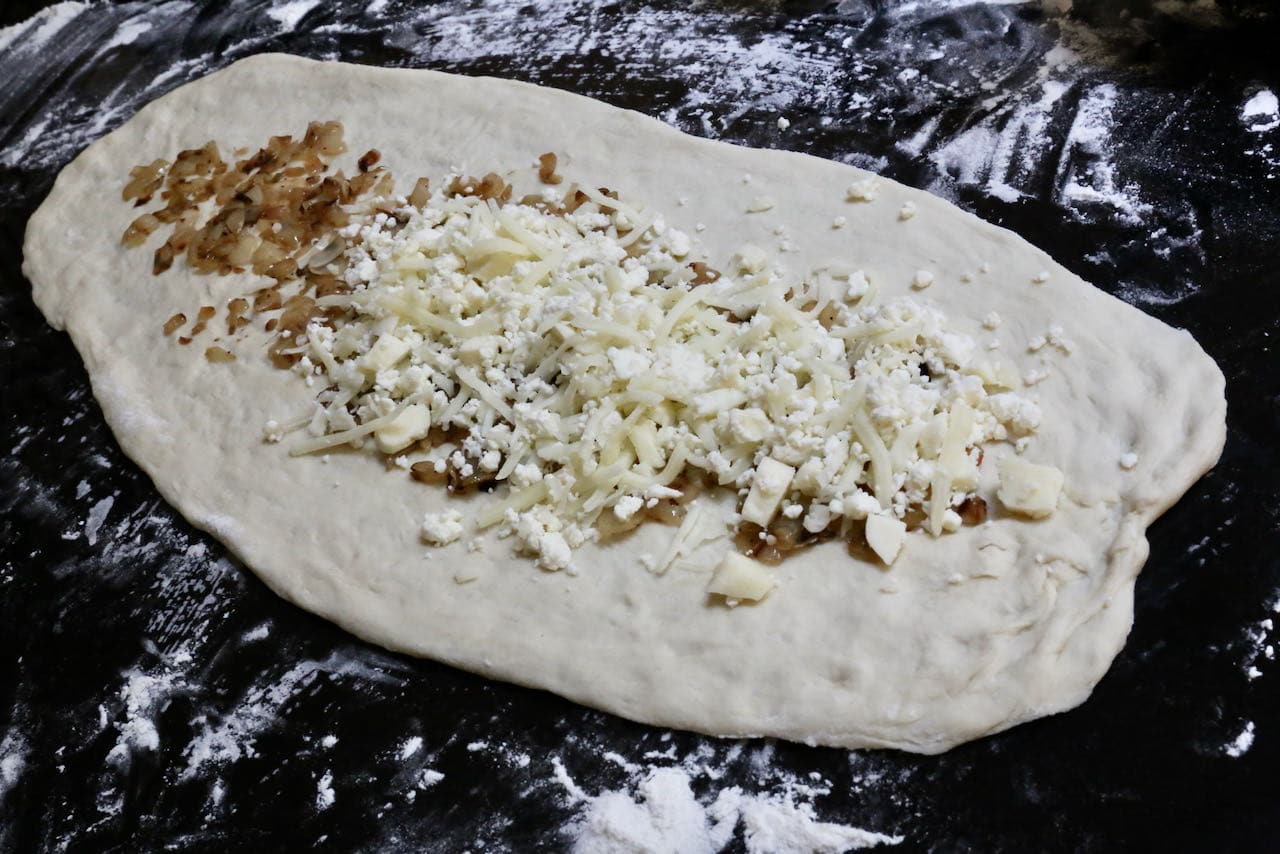
Peynirli Pide Ingredient Health Benefits
Our Peynirli Pide recipe is packed full of healthy ingredients!
It is only recently that scientists have begun to identify the components responsible for garlic’s myriad health benefits. Rich in phytochemicals and potassium, garlic helps boost your immune system, fight cancer and protect your heart.
Onions are a humble vegetable packed with vitamins, minerals and phytochemicals. Regular consumption of onions can help boost digestive health and reduce the risk of developing heart disease.
A rich source of phytochemicals and vitamin C, lemons help boost your immune system and neutralize free radicals that cause disease and skin aging. Lemons also protect against heart disease and help improve blood flow to the brain.
An excellent source of vitamin K, as well as vitamin C, folate, and iron, parsley helps keep your bones and blood healthy, and protects your skin from damage by free radicals.
Consuming dairy products (such as milk and cheese) provides health benefits — especially improved bone health. Dairy foods provide nutrients that are vital for health and maintenance of your body. These nutrients include calcium, potassium, vitamin D, and protein.
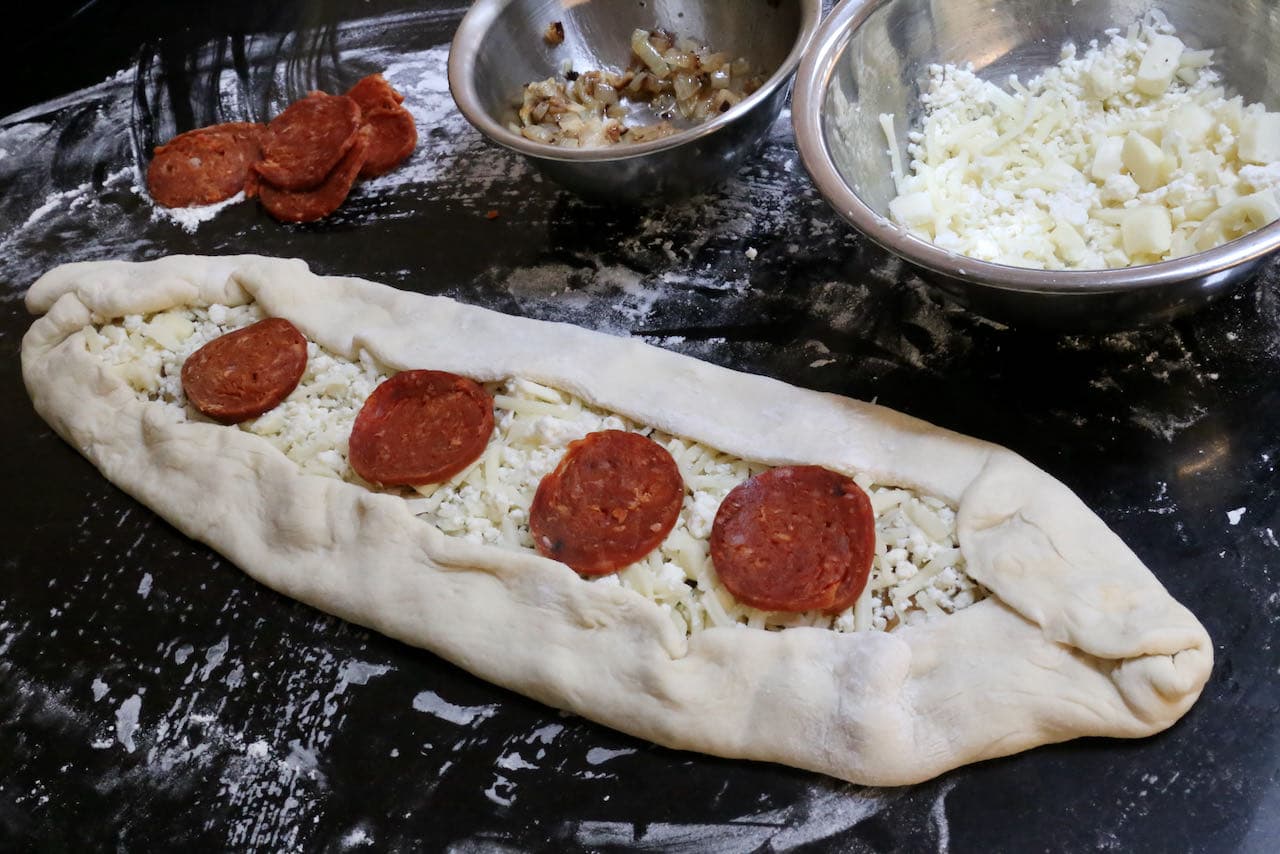
Turkish Pizza Recipe Tips
This homemade Peynirli Pide recipe is quick and easy to make at home. We’ve included a few tips for first time pide bakers!
- Use a large cast iron dutch oven with a high rim to reduce splatter when cooking.
- We suggest using a high quality rubber spatula spoon when sautéing vegetables and meat so you can easily stir, scrape down the side of the pot and have a quick taste to check if the recipe needs to be seasoned further.
- If you’d like to make the recipe really spicy, feel free to add chili paste, chili sauce, sliced chili or hot sauce.
- We’ve used a mixture of cheeses in this recipe that are known for their melting properties such as mozzarella and cheddar. You’ll find other recipes that include fresh Turkish cheeses and a mixture of goat, sheep and cow feta.
- If you’re serving vegetarians omit the Turkish cured sausage. You can enjoy a vegetarian Peynirli Pide by topping the Turkish cheese pizza with roasted eggplant, zucchini, olives and tomatoes.
- If you love a pepperoni pizza, topping Peynirli Pide with slices of sujuk offers a similar satisfaction. If you don’t have access to Turkish sausage, substitute for Spanish chorizo.
- Serve pide hot out of the oven with pickled peppers, lemon wedges, fresh parsley, garlic sauce, hot sauce and Turkish salads.

What To Serve with Peynirli Pide
If you’re hosting a large dinner party you might want to serve our Peynirli Pide recipe as an appetizer before serving heartier Turkish entrees.
We love serving Peynirli Pide as a main dish for a casual Turkish feast. Serve Turkish pizza alongside pickled peppers, lemon wedges, fresh parsley, garlic sauce and hot sauce. Since Turkish Pide is carb, protein and fat heavy, we suggest serving slices with fresh salads like Kisir and Ezme.
After dinner why not dazzle your guests with one of our popular desserts such as Oat Flour Cookies with Chocolate Chips, Dark Chocolate Lindt Lindor Cookies, Maraschino Cherry Cupcakes Recipe, Cinnamon Babka For Chocolate Lovers, Rhubarb Strawberry Dutch Baby or Jordgubbstårta Swedish Strawberry Cake.
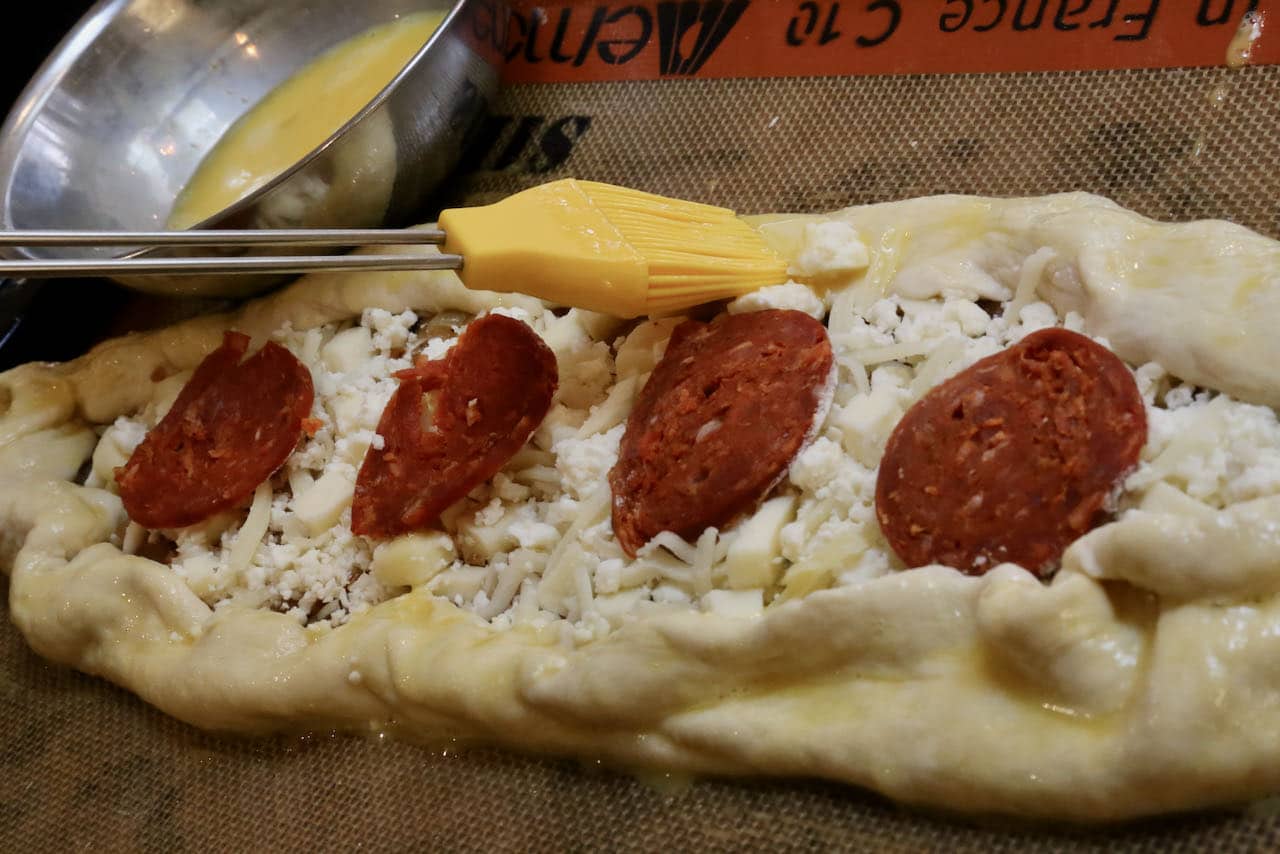
You May Also Enjoy Reading…
- Roasted Beetroot Salad with Grapefruit, Pistachio and Herbed Cream
- Mizeria Creamy Polish Cucumber Salad Recipe
- Goi Xoai Vietnamese Mango Salad Recipe
- Quick & Easy Indian Onion Salad Recipe
- Guasacaca Sauce: Venezuelan Guacamole Recipe
- Easy Creamy Warm Orzo Lemon Salad
- Easy Healthy Homemade Goi Ga Vietnamese Salad
- Easy Healthy Roasted Vegetable Couscous Recipe
- How To Make Healthy Sweet Potato Rice
- How To Make The Best Canadian Salad Recipe
- Healthy Garlic Lemon Chickpea Avocado Salad
- Easy Healthy Vegetarian French Onion Soup Recipe
- Cajun Louisiana Cream of Shrimp Soup Recipe
- Lebanese Lentil Soup Recipe: Healthy Adas Bil Hamod
- Ajiaco Cubano Recipe: Healthy Cuban Soup with Chicken
- Traditional Polish Sour Rye Zurek Soup Recipe
- Swedish Sandwich Cake: Easy Homemade Smorgastarta Recipe
- Chinese Ginger Garlic Soup Recipe for Colds
- Easy Citrus “Rojak” Singapore Salad Recipe
- Easy Homemade Jamaican Chicken Soup with Dumplings Recipe
- Vegetarian Roasted Pumpkin Feta Salad with Beetroot & Pine Nuts
- Healthy Roasted Pumpkin and Sweet Potato Soup Recipe
- Healthy Roasted Sweet Potato and Red Pepper Soup Recipe
- Healthy Homemade Carrot and Leek Soup Recipe
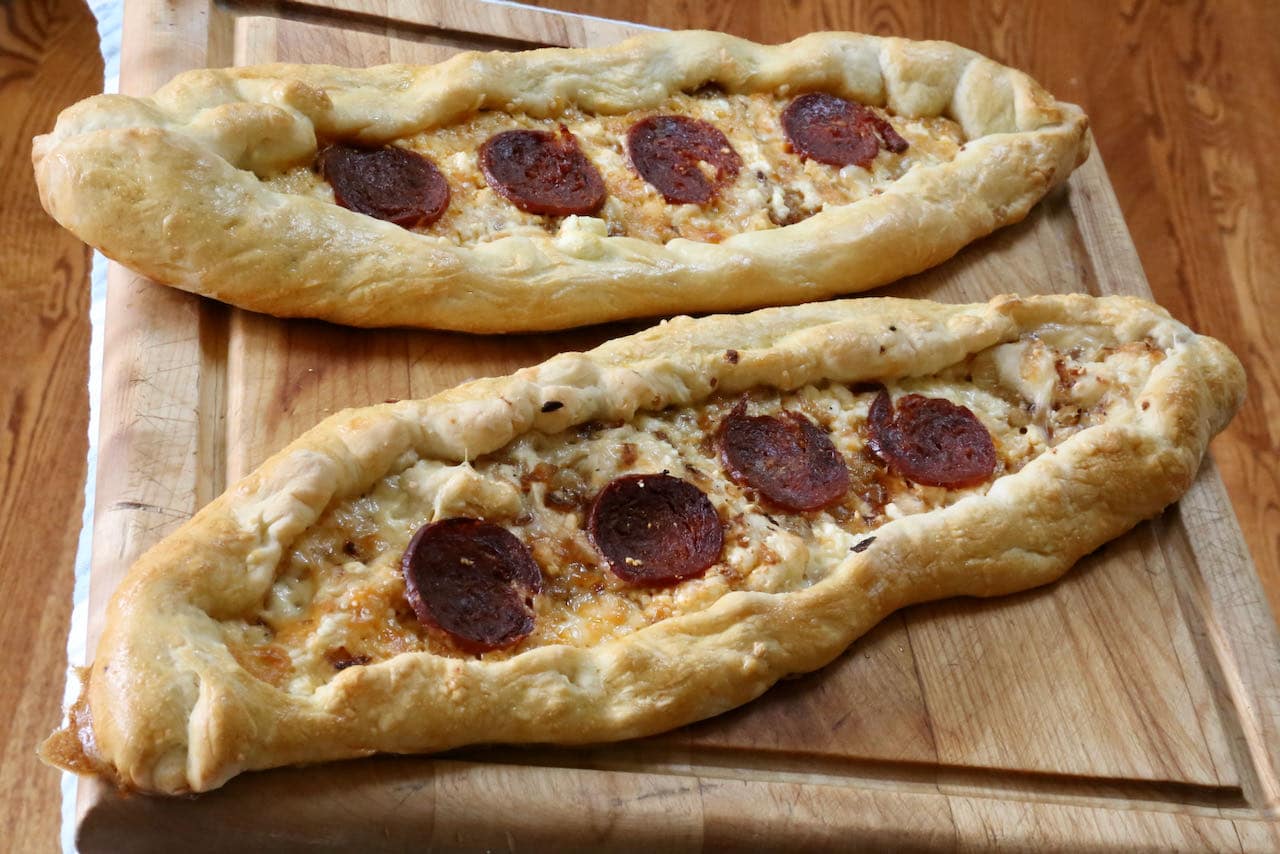
Storing Pide
If you have leftover Peynirli Pide you can store it in the fridge in an airtight container or large ziplock bag for 3-4 days. To reheat, simply place leftover slices on a baking sheet and bake in the oven until the crust is crispy.
We love doubling our Turkish Pide recipe so can store leftovers in the freezer and save time on cooking in the kitchen. We suggest storing leftover pide in Pyrex freezer safe containers that have a snug lid.
Be sure to let the pide reach room temperature before storing it in the freezer. If you add a hot containers to a cold freezer it will significantly reduce the interior temperature and potentially spoil your food.
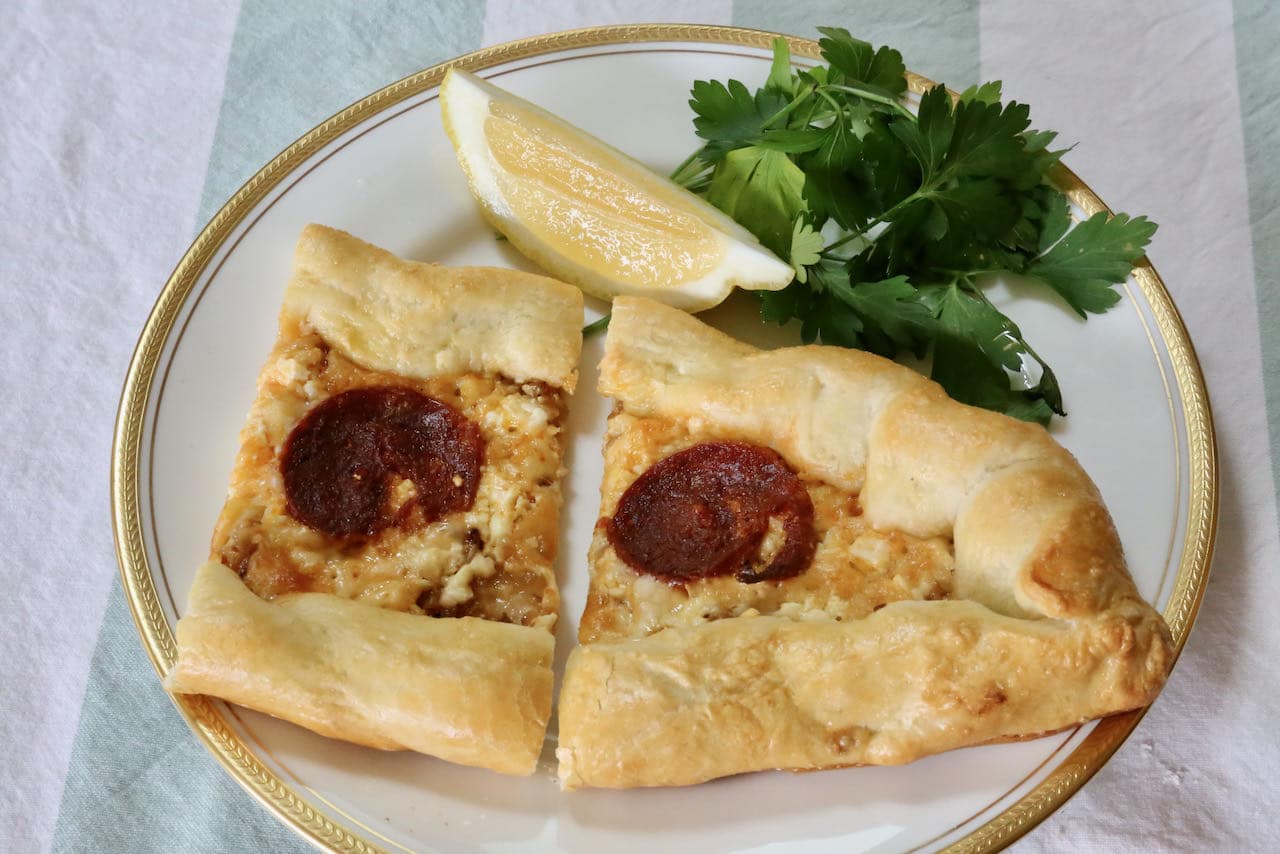
How To Bake Turkish Cheese Peynirli Pide
Peynirli Turkish Pide
Ingredients
Turkish Pide Dough
- 300 g All Purpose Flour
- 1 tsp Salt
- 4 tsp Active Dry Yeast
- 1 cup Warm Water
- 3 tbsp Olive Oil
Peynirli Pide Filling
- 1 tbsp Olive Oil
- 1 Onion minced
- 2 Garlic cloves minced
- 1 cup Feta Cheese crumbled
- 1/2 cup Cheddar Cheese shredded
- 1/2 cup Mozzarella shredded
- 100 g Chorizo Sausage sliced
- 1 Eggs beaten
- Parsley and Lemon garnish
Instructions
Turkish Pide Dough
- Preheat the oven to 350 F.
- Stir in the yeast in a small bowl and pour in ½ cup warm water. Dissolve the yeast in water, mixing with a small spoon. Set aside until the yeast mixture gets frothy, approximately 5 minutes.
- Combine the flour and salt in a large bowl.Make a well in the centre and pour in 2 tbsp. olive oil and the yeast mixture.
- Pour in the remaining 1/2 cup of warm water to the flour mixture. Using your hands, draw in the flour from the sides and work the mixture into a shaggy dough.
- On a floured surface, knead dough for 5 minutes, or until you reach a soft, smooth dough. The dough gets sticky as you knead, so pour the remaining 1 tbsp olive oil and stir in an additional 2 tbsp. flour if needed to help shape into a soft dough.
- Place the Turkish pide dough in large bowl and cover with a plastic wrap. Leave in a warm place for 1 hour, or until doubled in size.
Peynirli Pide Filling
- In the meantime, prepare your Peynirli Pide filling by grating mozzarella and cheddar cheeses. Crumble feta and set aside.
- In a non-stick pan add olive oil and over medium heat saute minced garlic and onions for 5-6 minutes until tender.
- Place the risen dough on a lightly floured surface. Knead the dough for a minute then divide the dough into two pieces and roll into two balls.
- On a lightly floured surface, roll the dough balls into 2 oval shapes of 20 cm x 40 cm with ½ cm thickness.
- Line a large baking sheet with parchment paper and place the 2 oval flat dough pieces on the tray.
- Use a spoon to spread the onion and garlic mixture onto the surface of both slices of dough.
- Sprinkle the feta, cheddar and mozzarella cheese over onion mixture, leaving 2 cm at the edges as a border with no filling.
- Fold in the sides to act as crust to keep the filling intact. Squeeze the oval dough at each end to make it pointy.
- Top each pide with slices of cured sausage like chorizo.
- Beat an egg in a small bowl and mix it with a few drips of olive oil. Brush the edges of dough with the egg mixture.
- Bake for 25-30 minutes, until the Turkish Pide are golden brown and crispy at the edges.
- Once cool, cut into slices and serve.
Nutrition
Some of the links in this story use affiliate links. This means that if you make a purchase through our site, Dobbernationloves will earn a small commission at no extra cost to you. Your support helps us to produce comprehensive content.
Save This Story To Pinterest!
